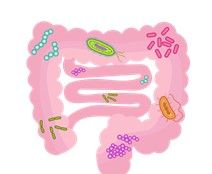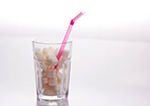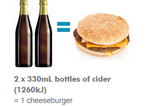Prebiotics and probiotics: a quick guide
by Guest Author,
- October 12, 2021
- Leave a comment
Kahlea Horton-French, student dietitian at Curtin University (2020)
We often hear about prebiotics and probiotics. And that they have something to do with gut health. But what actually are they? Read on to find out!
Probiotics
Probiotics are live microorganisms (particularly bacteria) that provide health benefits to the human body. Probiotic bacteria can be consumed through supplements but are also found naturally in fermented foods such as yoghurt, kefir, kimchi and sauerkraut. When you have probiotic foods or supplements some of the live bacteria join the other trillions of microorganisms that make up your gut microbiome. The more good bacteria that are in your gut, the less room there is for bad bacteria. These good bacteria also compete for nutrients and produce antimicrobial substances that prevent bad bacteria from taking up residence in the gut.

Probiotics consumed through food or supplements are not able to establish permanent residency in your gut; this means that you need to regularly include these in your diet in order for them to remain active in your gut. If you stop eating probiotic-rich foods, those strains of bacteria will not be present in your gut a few weeks after you have stopped eating them.
Do we need probiotic supplements?
The known benefits
- Probiotic supplements are tolerated well by most people
- Probiotic supplements contribute to increased bacterial diversity in the gut
- Research has found that probiotic supplements may help in certain situations, including:
- Diarrhoea relating to antibiotic use
- Reducing the risk of Clostridium difficile infection in people taking antibiotics
- Constipation
- Inducing or maintaining remission in ulcerative colitis (a type of inflammatory bowel disease)
The cons
- More research is needed to completely understand the specific strains of probiotic bacteria that are most helpful for gut health
- The benefits of fermented foods, such as yogurt, go beyond probiotics as these foods provide other beneficial nutrients
- Probiotics could be harmful for certain groups of people, in particular those with a weak immune system or those undergoing immunotherapy. We recommend that anyone in this situation talk to their doctor if they are considering taking probiotics!
For most people, there is no harm in taking probiotics, but we suggest including more probiotic-rich foods in your diet instead as these are going to provide extra nutritional benefits.
Prebiotics
Prebiotics refer to the different types of dietary fibre found in plant foods that provide fuel for your gut bugs so they can flourish! While prebiotics are found naturally in fruits, vegetables, legumes, grains, nuts and seeds, they can also be added to some foods. You can spot added sources of prebiotics by looking at the ingredients list – galactooligosaccharides, fructooligosaccharides, oligofructose, chicory fibre or inulin are common additions. When gut bacteria eat prebiotics they release substances into our body that give us health benefits, such as reducing inflammation.
Fun fact: Cooked and then cooled starchy foods such as pasta or potato are a great source of prebiotics and also make for a delicious lunch. Enjoy this pasta salad chilled for a hit of prebiotic-rich, gut-loving fibre.

The take home
Probiotics and prebiotics help keep you and your gut bugs healthy and happy. Eating a wide variety of plant foods and including probiotic-rich foods daily will help you achieve this. If you’d like to learn more about gut health, check out our blog!







